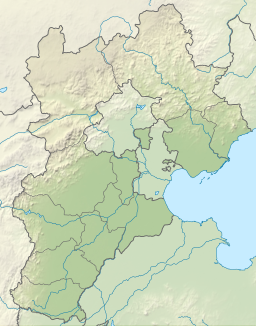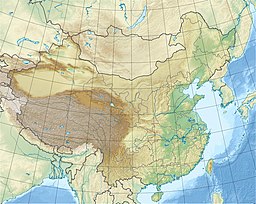Xidayang Reservoir
| Xidayang Reservoir 西大洋水库 | |
|---|---|
| Location | at the confluence of Tang River and Tongtian River[1] |
| Coordinates | 38°45′22″N 114°46′05″E / 38.75611°N 114.76806°E |
| Type | large-scale reservoir |
| Basin countries | China |
| Built | 1958[2] |
 | |
Xidayang Reservoir (Chinese: 西大洋水库[3]), also known as Xidayang Shuiku[4] or West Dayang Reservoir,[5] is a large-scale reservoir[6] located in Baoshui Township, Tang County, Baoding City, Hebei Province, China.[7]
History
[edit]West Dayang Reservoir was designed by the Design Institute of Hebei Provincial Water Resources Department (河北省水利厅设计院), [8] its construction began in 1958[9] and was completed in 1960. [10] In August 1970, the continued construction of the reservoir was completed.[11]
In 2005, Xidayang Reservoir's consolidating and de-danger engineering (除险加固工程) started, with a total investment of 198 million yuan and a construction period of 36 months. [12]
In 2008, the connection project between Xidayang Reservoir and Wangkuai Reservoir was started,[13] and in 2012, the connection project was completed.[14]
References
[edit]- ^ Zhang Xiaolin (1999). Tang County History. Hebei People's Publishing House. pp. 176–. ISBN 978-7-202-02453-9.
- ^ Tang County Land History. Tang County Land Management Bureau. 2002. pp. 61–.
- ^ "Wangkuai Reservoir and Xidayang Reservoir will once again supply water to Baiyangdian Lake this year". Xinhua News Agency. 2017-11-20.[dead link]
- ^ Chinese Dictionary of Water Names. Harbin Map Press. 1995. pp. 269–. ISBN 978-7-80529-266-3.
- ^ Yang, Wei; Yang, Zhifeng (Apr 15, 2014). "Analyzing Hydrological Regime Variability and Optimizing Environmental Flow Allocation to Lake Ecosystems in a Sustainable Water Management Framework: Model Development and a Case Study for China's Baiyangdian Watershed". ASCE Library. Vol. 19, no. 5. pp. 993–1005. doi:10.1061/(ASCE)HE.1943-5584.0000874.
- ^ "Great Leap Forward in Water Resources". Sohu.com. 2009-10-14.
- ^ History of Hebei Province: History of Water Resources. Vol. 20. Hebei People's Publishing House. 1995. pp. 98–. ISBN 9787202018132.
- ^ "These reservoirs in Hebei are very beautiful How many have you seen?". Ifeng.com. 2017-01-07.
- ^ Qing Yuan County History. Xinhua Publishing House. 1991. pp. 236–. ISBN 978-7-5011-1460-3.
- ^ "Most of the water used by residents in Baoding urban area comes from reservoirs, "ecological fish" purifies water". China News Service. 2013-03-22.
- ^ Lu Chunfang (1999). History of Lixian. Zhonghua Book Company. pp. 410–. ISBN 9787101025217.
- ^ "Xidayang Reservoir's consolidating and de-danger engineering starts". Sina. 2005-05-17.
- ^ "Xidayang and Wangkuai Reservoir will be connected two years later". Sina. 2008-10-30.
- ^ "Two major reservoirs in Baoding, Hebei are connected to supply over 100 million cubic meters of water to Baiyangdian in a year". China News Service. 2012-05-30.



